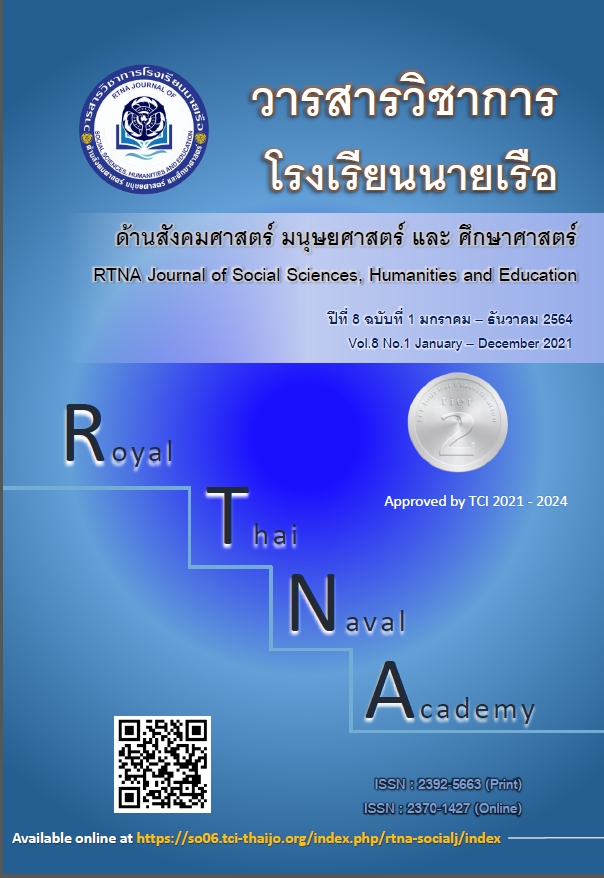Educational Supervision in the Situation of the COVID-19 Epidemic : A Case Study on A Using SM3 supervisory process
Keywords:
Supervision Process, Teacher Development,, Classroom Action ResearchAbstract
Reformation of traditional education supervision was accelerated by the 2019 COVID-19 pandemic, prompting an educational supervision process which is the combination between participatory action research and blended learning concepts. The supervisory process is SM3, where SM1 is social media supervision, SM2 is supervision Meeting, and SM3 is supervisory by opening innovation houses. The supervision activities were adjusted according to the coronavirus outbreak situation following the measure from the government. Supervising learning innovation, supervisors via social media, from classroom research of primary school teachers helps teachers to invent teaching innovation. Most teachers strongly believe that the educational supervision process initiates knowledge and understanding to develop learning innovation and to improve writing for an innovation development report. The supervision is strongly supported by that the innovations from 30 schools are qualified as the district quality schools project under the Office of the Basic Education Commission Ministry of Education.
References
ประทีป ทองด้วง และจุติพร ขาวมะลิ. (2562). การจัดการความรู้ในการสร้างรูปแบบนิเทศการศึกษาที่เหมาะสมสำหรับสร้างความเข้มแข็งให้กับระบบนิเทศภายในโรงเรียน สังกัดสำนักงานเขตพื้นที่การศึกษาประถมศึกษาสุราษฎร์ธานี เขต 2. สุราษฎร์ธานี: สังกัดสำนักงานเขตพื้นที่การศึกษาประถมศึกษาสุราษฎร์ธานี เขต 2.
พัชนี ยุรชัย และคณะ. (2552). การพัฒนาครูด้านการทำวิจัยในชั้นเรียนของโรงเรียนภัทรดล อำเภอโพธิ์ชัย จังหวัดร้อยเอ็ด. วารสารมหาวิทยาลัยราชภัฎมหาสารคาม, 3(3), 129-142
วัชรา เล่าเรียนดี. (2556). ศาสตร์การนิเทศการสอน และการโค้ช การพัฒนาวิชาชีพ : ทฤษฎีกลยุทธ์สู่การปฏิบัติ. พิมพ์ครั้งที่ 12. นครปฐม: โรงพิมพ์มหาวิทยาลัยศิลปากร วิทยาเขต พระราชวังสนามจันทร์นครปฐม.
วิจารณ์ พานิช. (2551). การจัดการความรู้จากงานประจำสู่งานวิจัย. หมออนามัย, 18(1), 25–28.
สำนักงานเขตพื้นที่การศึกษาประถมศึกษาสุราษฎร์ธานี เขต 2. (2563). การวิจัยเชิงผสมผสานเพื่อพัฒนานวัตกรรมการจัดการเรียนรู้โดยใช้กระบวนการวิจัยเชิงปฏิบัติการ (SM3) และการประยุกต์ใช้ทฤษฎีฐานราก (Grounded theory) ในการสังเคราะห์รูปแบบการจัดการเรียนรู้โรงเรียนคุณภาพประจำตำบลภายใต้สถานการณ์การแพร่ระบาดของโรคติดต่อเชื้อไวรัสโคโรนา 2019 สังกัดสำนักงานเขตพื้นที่การศึกษาประถมศึกษาสุราษฎร์ธานี เขต 2. สุราษฎร์ธานี: สำนักงานเขตพื้นที่การศึกษาประถมศึกษาสุราษฎร์ธานีเขต 2.
Anderson, C., Day K., & McLaughlin, P. (2006). Mastering the dissertation: Lecturers’ representations of the purposes and process of master’s level dissertation supervision. Studies in Higher Education, 31(2), 149-168.
Augustsson, G., & Jaldemark, J. (2014). Online supervision: A theory of supervisors' strategic communicative influence on student dissertations. Higher Education, 67(1), 19-33.
Mette, I. (2020). Reflections on Supervision in the Time of COVID-19. Journal of Educational Supervision, 3(3). https://doi.org/10.31045/jes.3.3.1
Kemmis, S., Mctaggart, R. & Nixon, R. (2014). The Action Research Planner: Doing Critical Participatory Action Research. Singapore: Springer Singapore. https://doi.org/10.1007/978-981-4560-67-2
Wiles, J., & Bondi, J. (2004). Supervision: A Guide to Practice. (6Th ed.) New Jersey: Pearson.
Prentice-Hall.
Downloads
Published
Issue
Section
License
The author has the sole responsibility for the material published in RTNA Journal of Social Sciences, Humanities, and Education, which the editorial team may not agree on that material.
RTNA Journal of Social Sciences, Humanities, and Education owns the copyright of the text, the illustration, or other material published in the journal. No parts or the whole of the material published may be disseminated or used in any form without first obtaining written permission from the academy.






